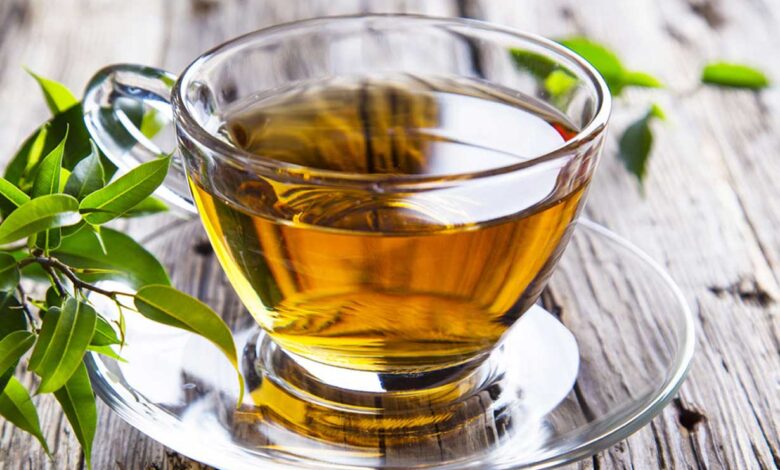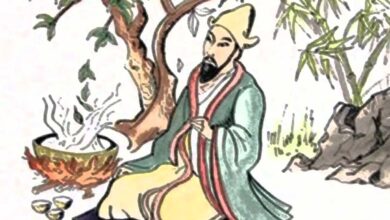Il Tè
Il Tè – Bibliografia

- Aktas O et al: Green tea epigallocatechin-3-gallate mediates T cellular NF-kappa B inhibition and exerts neuroprotection in autoimmune encephalomyelitis, J Immunol 2004 Nov 1;173(9):5794-800 PMID 15494532
- Antonello M, Montemurro D, Bolognesi M et al: Prevention of hypertension, cardiovascular damage and endothelial dysfunction with green tea extracts, Am J Hypertens 2007 Dec;20(12):1321-8, PMID 18047924
- Bettuzzi S, Brausi M, Rizzi F, Castagnetti G, Peracchia G, Corti A. Chemoprevention of human prostate cancer by oral administration of green tea catechins in volunteers with high-grade prostate intraepithelial neoplasia: a preliminary report from a one-year proof-of-principle study. Cancer Res. 2006 Jan 15;66(2):1234-40
- Boschmann M, Thielecke F. Universitary Medicine Berlin, Charité Campus Buch, Franz-Volhard-Center for Clinical Research, Germany. The effects of epigallocatechin-3-gallate on thermogenesis and fat oxidation in obese men: a pilot study. J Am Coll Nutr. 2007 Aug;26(4):389S-395S
- Burckhardt IC, IC, Gozal D, Dayyat E et al: Green tea catechin polyphenols attenuate behavioral and oxidative responses to intermittent hypoxia, Am J Respir Crit Care Med 2008 May 15;177(10):1135-41. Epub 2008 Feb 14, PMID 18276944
- Call J.A. et al. Endurance capacity in maturing mdx mice is markedly enhanced by combined voluntary wheel running and green tea extract. J Appl Physiol. 2008;105(3):923-32
- Camouse M.M. et al. Topical application of green and white tea extracts provides protection from solar-simulated ultraviolet light in human skin. Exp Dermatol. 18(6):522-6, 2009
- Carlson JR, Bauer BA, Vincent A, Limburg PJ, Wilson T. Reading the tea leaves: anticarcinogenic properties of (-)-epigallocatechin-3-gallate. Mayo Clin Proc 2007; 82(6) 725-732
- Chan K.H. et al. Chinese green tea ameliorates lung injury in cigarette smoke-exposed rats. Respir Med. 2009 Nov;103(11):1746-54
- Chen D, Milacic V, Chen MS, Wan SB, Lam WH, Huo C, Landis-Piwowar KR, Cui QC, Wali A, Chan TH, Dou QP. Tea polyphenols, their biological effects and potential molecular targets. Histol Histopathol. 2008 Apr;23(4):487-96
- Choo JJ. Green tea reduces body fat accretion caused by high-fat diet in rats through beta-adrenoceptor activation of thermogenesis in brown adipose tissue. J Nutr Biochem. 2003 Nov;14(11):671-6
- Clark J, You M: Chemoprevention of lung cancer by tea, Mol Nutr Food Res 2006 Feb;50(2):144-51, PMID 16425282
- Coimbra S, Castro E, Rocha-Pereira P, Rebelo I, Rocha S, Santos-Silva A. The effect of green tea in oxidative stress. Clin Nutr. 2006 Oct;25(5):790-6.
- Dean S, Braakhuis A, Paton C. The effects of EGCG on fat oxidation and endurance performance in male cyclists. Int J Sport Nutr Exerc Metab. 2009 Dec;19(6):624-44
- Didiano D, Shalaby T, Lang D, Grotzer MA: Telomere maintenance in childhood primitive neuroectodermal brain tumors, Neuro Oncol 2004 Jan;6(1):1-8, PMID 14769133
- Dulloo AG et al: Efficacy of a green tea extract rich in catechin polyphenols and caffeine in increasing 24-h energy expenditure and fat oxidation in humans, Am J Clin Nutr 1999 Dec;70(6):1040-5 PMID 10584049
- Eichenberger P, Colombani PC, Mettler S. Effects of 3-week consumption of green tea extracts on whole-body metabolism during cycling exercise in endurance-trained men. Int J Vitam Nutr Res. 2009 Jan;79(1):24-33
- Engelhardt U.H.; In Comprehensive Natural Products II, Chemistry and Biology; Chemistry of Tea, Mander, L., Lui, H.-W., Eds.; Elsevier: Oxford, 2010; vol.3; pp 999-1032U
- Fujiki H, Suganuma M, Okabe S, Sueoka N, Komori A, Sueoka E, Kozu T, Tada Y, Suga K, Imai K, Nakachi K. Cancer inhibition by green tea. Mutation Research 1998; 402: 307-10
- Golden EB, Lam PY et al: Green tea polyphenols block the anticancer effects of bortezomib and other boronic acid-based proteasome inhibitors, Blood 2009 Feb 3, PMID 19190249
- Graham HN: Green tea composition, consumption, and polyphenol chemistry, Prev Med 1992 May;21(3):334-50 PMID 1614995
- Green CJ, de Dauwe P, Boyle T, Tabatabaei SM, Fritschi L, Heyworth JS. Tea, coffee, and milk consumption and colorectal cancer risk. J Epidemiol. 2014;24(2):146-53. Epub 2014 Feb 15
- Gupta S, Ahmad N, Nieminen AL, Mukhtar H. Growth inhibition, cell-cycle dysregulation, and induction of apoptosis by green tea constituent (-)-epigallocatechin-3-gallate in androgen-sensitive and androgen insensitive human prostate carcinoma cells. Toxicol Appl Pharmacol. 2000 Apr 1;164(1):82-90
- Hara Y. Influence of tea catechins on the digestive tract. J Cell Biochem 1997; 27 (Supplement): 52-8
- Hazqui N et al: Epigallocatechin-3-gallate (EGCG) inhibits the migratory behavior of tumor bronchial epithelial cells, Respir Res 2008 Apr 21;9:33 PMID 18426555
- Heo JC, Rho JR, Kim TH, Kim SY, Lee SH. An aqueous extract of green tea Camellia sinensis increases expression of Th1 cell-specific anti-asthmatic markers. Int J Mol Med. 2008 Dec;22(6):763-7
- Hsu et al: Green tea polyphenols reduce autoimmune symptoms in a murine model for human Sjogren’s syndrome and protect human salivary acinar cells from TNF-alpha-induced cytotoxicity, Autoimmunity 2007 Mar;40(2):138-47 PMID 17364504
- Hsu S, Dickinson DP, Qin H et al: Inhibition of autoantigen expression by (-)-epigallocatechin-3-gallate (the major constituent of green tea) in normal human cells, J Pharmacol Exp Ther 2005 Nov;315(2):805-11 Epub 2005 Jul 26 PMID 16046615
- http://www.teatalk.com/science/chemistry.htm
- Ikeda I et al: Tea catechins with a galloyl moiety suppress postprandial hypertriacylglycerolemia by delaying lymphatic transport of dietary fat in rats, J Nutr 2005 Feb;135(2):155-9 PMID 15671206
- Jankun J, Selman SH, Swiercz R, Skrzypczak-Jankun E. Why drinking green tea could prevent cancer. Nature. 1997 Jun 5;387(6633):561
- Jankun J, Selman SH, Swiercz R, Skrzypczak-Jankun E. Why drinking green tea could prevent cancer. Nature. 1997 Jun 5;387(6633):561
- Jun X, Shuo Z, Bingbing L, Rui Z, Ye L, Deji S, Guofeng Z. Separation of major catechins from green tea by ultrahigh pressure extraction. Int J Pharm. 2010 Feb 15;386(1-2):229-31
- Kaneko S et al: Molecular and Sensory Studies on the Umami Taste of Japanese Green Tea, J. Agric. Food Chem.. 2006 Apr 5;54(7):2688-94. PMID 16569062
- Kang WS, Lim IH, Yuk DY et al: Antithrombotic activities of green tea catechins and (-)-epigallocatechin gallate, Thromb Res 1999 Nov 1;96(3):229-37, PMID 10588466
- Kao YH, Chang HH, Lee MJ, Chen CL. Tea, obesity, and diabetes.. Mol Nutr Food Res. 2006 Feb;50(2):188-210
- Khan SA et al: Influence of green tea on enzymes of carbohydrate metabolism, antioxidant defense, and plasma membrane in rat tissues, Nutrition 2007 Sep;23(9):687-95, PMID 17679048
- Khan SG, Katiyar SK, Agarwal R, Mukhtar H. Enhancement of antioxidant and phase II enzymes by oral feeding of green tea polyphenols in drinking water to SKH-1 hairless mice: possible role in cancer chemoprevention. Cancer Res. 1992 Jul 15;52(14):4050-2.
- Kim et al: Green tea protects rats against autoimmune arthritis by modulating disease-related immune events, J Nutr 2008 Nov;138(11):2111-6 PMID 18936206
- Kimura K et al: L-Theanine reduces psychological and physiological stress responses, Biol Psychol. 2007 Jan;74(1):39-45. Epub 2006 Aug 22. PMID 16930802
- Kimura K, Ozeki M, Juneja LR, Ohira H. Theanine reduces psychological and physiological stress responses, Biol Psychol. 2007 Jan;74(1):39-45. Epub 2006 Aug 22. PMID 16930802
- Kono S, Ikeda M, Tokudome S, Kuratsune M. A case-control study of gastric cancer and diet in northern Kyushu, Japan. Jpn J Cancer Res. 1988 Oct;79(10):1067-74.
- Kono S, Shinchi K, Wakabayashi K, Honjo S, Todoroki I, Sakurai Y, Imanishi K, Nishikawa H, Ogawa S, Katsurada M. Relation of green tea consumption to serum lipids and lipoproteins in Japanese men. J Epidemiol 1996; 6: 128-33
- Kurahashi N, Sasazuki S et al: Green tea consumption and prostate cancer risk in Japanese men: a prospective study, Am J Epidemiol 2008 Jan 1;167(1):71-7. Epub 2007 Sep 29, PMID 17906295
- Kuriyama S et al: Green tea consumption and cognitive function: a cross-sectional study from the Tsurugaya Project 1, Am J Clin Nutr 2006 Feb;83(2):355-61, PMID 16469995
- Kuriyama S et al: Green tea consumption and mortality due to cardiovascular disease, cancer, and all causes in Japan: the Ohsaki study, JAMA 2006 Sep 13;296(10):1255-65, PMID 16968850
- Lambert JD, Sang S, Yang CS: Possible controversy over dietary polyphenols: benefits vs risks, Chem Res Toxicol 2007 Apr;20(4):583-5. Epub 2007 Mar 16, PMID 17362033
- Larsson SC, Wolk A : Tea consumption and ovarian cancer risk in a population-based cohort, Arch Intern Med 2005 Dec 12-26;165(22):2683-6, PMID 16344429
- Lee AH, Liang W, Hirayama F, Binns CW. Association between green tea consumption and lung cancer risk. J Prev Med Public Health. 2010 Jul;43(4):366-7. doi: 10.3961/jpmph.2010.43.4.366.
- Lee MS, Kim CT, Kim Y. Green tea (-)-epigallocatechin-3-gallate reduces body weight with regulation of multiple genes expression in adipose tissue of diet-induced obese mice. Ann Nutr Metab. 2009;54(2):151-157
- Lee YK, Bone ND, Strege AK, Shanafelt TD, Jelinek DF, Kay NE. VEGF receptor phosphorylation status and apoptosis is modulated by a green tea component, epigallocatechin-3-gallate (EGCG), in B-cell chronic lymphocytic leukemia. Blood. 2004 Aug 1;104(3):788-94
- Liang W. et al. Tea Consumption and Ischemic Stroke Risk. A Case-Control Study in Southern China. Stroke. 2009 May 28
- Liao S, Hiipakka RA. Selective inhibition of steroid 5 alpha-reductase isozymes by tea epicatechin-3-gallate and epigallocatechin-3-gallate. Biochem Biophys Res Commun. 1995 Sep 25;214(3):833-8.
- Liao S, Kao YH, Hiipakka RA. Green tea: biochemical and biological basis for health benefits. Vitamins and Hormones 2001;62
- Liao S, Kao YH, Hiipakka RA. Green tea: biochemical and biological basis for health benefits. Vitamins and Hormones 2001;62
- Liao S, Kao YH, Hiipakka RA. Green tea: biochemical and biological basis for health benefits. Vitamins and Hormones 2001;62
- Lin JK, Lin-Shiau SY. Mechanisms of hypolipidemic and anti-obesity effects of tea and tea polyphenols. Mol Nutr Food Res. 2006 Feb;50(2):211-7
- Lin YS, Tsai YJ, Tsay JS, Lin JK. Factors affecting the levels of tea polyphenols and caffeine in tea leaves. J Agric Food Chem. 2003 Mar 26;51(7):1864-73
- Liu P, Zhang M, Jin J, Holman CD. Tea consumption reduces the risk of de novo myelodysplastic syndromes. Leuk Res. 2014 Dec 2. pii: S0145-2126(14)00372-5. doi: 10.1016/j.leukres.2014.11.020. [Epub ahead of print]
- Luo KW, Ko CH, Yue GG, Lee JK, Li KK, Lee M, Li G, Fung KP, Leung PC, Lau CB. Green tea (Camellia sinensis) extract inhibits both the metastasis and osteolytic components of mammary cancer 4T1 lesions in mice. J Nutr Biochem. 2014 Apr;25(4):395-403. doi: 10.1016/j.jnutbio.2013.11.013. Epub 2013 Dec 31
- Mandel S, Youdim MB: Catechin polyphenols: neurodegeneration and neuroprotection in neurodegenerative diseases, Free Radic Biol Med.. 2004 Aug 1;37(3):304-17 PMID 15223064; Green tea could protect against Alzheimer’s
- Mao W et al: Molecular mechanism by which green tea and tea extract inhibits left ventricle hypertrophy induced by renovascular hypertension in rats, Wei Sheng Yan Jiu 2008 Jan;37(1):43-6, PMID 18421862
- Maron DJ et al: Cholesterol-lowering effect of a theaflavin-enriched green tea extract: a randomized controlled trial, Arch Intern Med 2003 Jun 23;163(12):1448-53 PMID 12824094
- Mazzanti G, Menniti-Ippolito F, Moro PA, Cassetti F, Raschetti R, Santuccio C, Mastrangelo S. Hepatotoxicity from green tea: a review of the literature and two unpublished cases. Eur J Clin Pharmacol 2009; 65:331–341
- Miura S, Watanabe J, Sano M, Tomita T, Osawa T, Hara Y, Tomita I. Effects of various natural antioxidants on the Cu(2+)-mediated oxidative modification of low density lipoprotein. Biol Pharm Bull 1995; 18: 1-4
- Molinari M, Watt KD, Kruszyna T, Nelson R, Walsh M, Huang WY, Nashan B, Peltekian. Acute liver failure induced by green tea extracts: case report and review of the literature. Liver Transpl. 2006 Dec;12(12):1892-5
- Mukhtar H, Ahmad N. Tea polyphenols: prevention of cancer and optimizing health. Am J Clin Nutr 2000; 71: Suppl 6: 1698S-1702S
- Murase T. et al. Green tea extract improves running endurance in mice by stimulating lipid utilization during exercise. Am J Physiol Regul Integr Comp Physiol. 290(6):R1550-6, 2006.
- Murr C, Schroecksnadel K, Winkler C, Ledochowski M, Fuchs D. Antioxidants may increase the probability of developing allergic diseases and asthma. Med Hypotheses. 2005;64(5):973-7
- Nagao T et al: Green tea extract high in catechins reduces body fat and cardiovascular risks in humans, Obesity (Silver Spring) 2007 Jun;15(6):1473-83 PMID 15914933
- Nagao T et al: Ingestion of a tea rich in catechins leads to a reduction in body fat and malondialdehyde-modified LDL in men, Am J Clin Nutr 2005 Jan;81(1):122-9 PMID 15640470
- Nagao T et al: Ingestion of a tea rich in catechins leads to a reduction in body fat and malondialdehyde-modified LDL in men, Am J Clin Nutr 2005 Jan;81(1):122-9 PMID 12824094
- Oguni I, Nasu K, Kanaya S, Ota Y, Yamamoto S, Nomura T. Epidemiological and experimental studies on the antitumor activity by green tea extracts. Jpn J Nutr. 1989; 47,93-102
- Ohmori R, Iwamoto T, Tago M, Takeo T, Unno T, Itakura H, Kondo K. Antioxidant activity of various teas against free radicals and LDL oxidation. Lipids. 2005; 40(8):849-53
- Pajonk F et al: The effects of tea extracts on proinflammatory signaling, BMC Med. 2006 Dec 1;4:28 PMID 17140430
- Palermo C et al: Identification of Potential Aryl Hydrocarbon Receptor Antagonists in Green Tea, Chem. Res. Toxicol. 16 (7), 865-872, 2003. http://dx.doi.org/10.1021/tx025672c
- Pan T, Jankovic J, Le W: Potential therapeutic properties of green tea polyphenols in Parkinson’s disease, Drugs Aging 2003;20(10):711-21 PMID 12875608
- Phung OJ, Baker WL, Matthews LJ, Lanosa M, Thorne A, Coleman CI. Effect of green tea catechins with or without caffeine on anthropometric measures: a systematic review and meta-analysis. Am J Clin Nutr. 2010 Jan;91(1):73-81
- org – Pillole: Epatotossicità da tè verde
- Potenza MA, Marasciulo FL, Tarquinio M, Tiravanti E, Colantuono G, Federici A, Kim JA, Quon MJ, Montagnani M. EGCG, a green tea polyphenol, improves endothelial function and insulin sensitivity, reduces blood pressure, and protects against myocardial I/R injury in SHR. Am J Physiol Endocrinol Metab. 2007 May;292(5):E1378-87
- Rall TW. Farmaci usati nel trattamento dell’asma. Le metilxantine, il cromoglicato e altri agenti. In: Goodman & Gilman, Le Basi Farmacologiche della Terapia. Zanichelli, 8° Edizione, Bologna, 1990, pag. 570-572
- Richard D, Kefi K, Barbe U, Poli A, Bausero P, Visioli F. Weight and plasma lipid control by decaffeinated green tea. Pharmacol Res. 2009 May;59(5):351-4
- Rodríguez-Caso C et al: Green tea epigallocatechin-3-gallate is an inhibitor of mammalian histidine decarboxylase, Cell Mol Life Sci. 2003 Aug;60(8):1760-3 PMID 14521154
- Sarma DN, Barrett ML, Chavez ML, Gardiner P, Ko R, Mahady GB, Marles RJ, Pellicore LS, Giancaspro GI, Low Dog T. Safety of green tea extracts: a systematic review by the US Pharmacopeia. Drug Saf. 2008;31(6):469-84
- Sartippour MR et al: The combination of green tea and tamoxifen is effective against breast cancer, Carcinogenesis 2006 Dec;27(12):2424-33. Epub 2006 Jun 19, PMID 16785249
- Savitri Kumar N, Maduwantha B Wijekoon WM, Kumar V, Nimal Punyasiri PA, Sarath B Abeysinghe I. Separation of proanthocyanidins isolated from tea leaves using high-speed counter-current chromatography. J Chromatogr A. 2009 May 8;1216(19):4295-302
- Setiawan VW, Zhang ZF et al, Protective effect of green tea on the risks of chronic gastritis and stomach cancer. Int J Cancer: 2001; 92:600-604
- Shixian Q, VanCrey B, Shi J, Kakuda Y, Jiang Y. Green tea extract thermogenesis-induced weight loss by epigallocatechin gallate inhibition of catechol-O-methyltransferase. J Med Food. 2006 Winter;9(4):451-8
- Sinha D, Dey S, Bhattacharya RK, Roy M : In vitro mitigation of arsenic toxicity by tea polyphenols in human lymphocytes, J Environ Pathol Toxicol Oncol 2007;26(3):207-20 PMID 18197836
- Son DJ, Cho MR, Jin YR, Kim SY, Park YH, Lee SH, Akiba S, Sato T, Yun YP. Antiplatelet effect of green tea catechins: a possible mechanism through arachidonic acid pathway. Prostaglandins Leukot Essent Fatty Acids. 2004 Jul;71(1):25-31
- Stensvold I, Tverdal A, Solvoll K, Foss OP. Tea consumption. relationship to cholesterol, blood pressure, and coronary and total mortality. Prev Med. 1992 Jul;21(4):546-53.
- Sueoka N et al: A new function of green tea: prevention of lifestyle-related diseases, Ann N Y Acad Sci. 2001 Apr;928:274-80 PMID 11795518
- Sumpio BE et al: Green tea, the “Asian paradox,” and cardiovascular disease, J Am Coll Surg 2006 May;202(5):813-25, PMID 16648021
- Sun CL et al: Green tea, black tea and breast cancer risk: a meta-analysis of epidemiological studies, Carcinogenesis 2006 Jul;27(7):1310-5. Epub 2005 Nov 25, PMID 16311246
- Sun CL et al: Green tea, black tea and colorectal cancer risk: a meta-analysis of epidemiologic studies, Carcinogenesis 2006 Jul;27(7):1301-9. Epub 2006 Apr 25, PMID 16638787
- Tang N, Wu Y, Zhou B, Wang B, Yu R. Green tea, black tea consumption and risk of lung cancer: a meta-analysis. Lung Cancer. 2009 Sep;65(3):274-83. doi: 10.1016/j.lungcan.2008.12.002. Epub 2009 Jan 6
- US FDA/CFSAN – Letter Responding to Health Claim Petition dated January 27, 2004: Green Tea and Reduced Risk of Cancer Health Claim (Docket number 2004Q-0083)
- Venables MC et al: Green tea extract ingestion, fat oxidation, and glucose tolerance in healthy humans, Am J Clin Nutr 2008 Mar;87(3):778-84, PMID 18326618
- Westerterp-Plantenga MS, Lejeune MP, Kovacs EM. Body weight loss and weight maintenance in relation to habitual caffeine intake and green tea supplementation. Obes Res. 2005 Jul;13(7):1195-204
- Westerterp-Plantenga MS. Green tea catechins, caffeine and body-weight regulation. Physiol Behav. 2010 Feb 13. [Epub ahead of print]
- Williamson MP et al: Epigallocatechin gallate, the main polyphenol in green tea, binds to the T-cell receptor, CD4: Potential for HIV-1 therapy, J Allergy Clin Immunol 2006 Dec;118(6):1369-74 Epub 2006 Oct 13 PMID 17157668
- Xiao H et al: Green tea polyphenols inhibit colorectal aberrant crypt foci (ACF) formation and prevent oncogenic changes in dysplastic ACF in azoxymethane-treated F344 rats, Carcinogenesis 2008 Jan;29(1):113-9. Epub 2007 Sep 24, PMID 17893236
- Yang CS, Wang ZY. Tea and cancer. J Natl Cancer Inst. 1993 Jul 7;85(13):1038-49; Naasani I, Seimiya H, Tsuruo T. Telomerase inhibition, telomere shortening, and senescence of cancer cells by tea catechins. Biochem Biophys Res Commun. 1998 Aug 19;249(2):391-6
- Yang G, Shu XO, Li H et al: Prospective cohort study of green tea consumption and colorectal cancer risk in women, Cancer Epidemiol Biomarkers Prev 2007 Jun;16(6):1219-23, PMID 17548688
- Yao et al: Epigallocatechin gallate protects against oxidative stress-induced mitochondria-dependent apoptosis in human lens epithelial cells, Mol vis. 2008 Jan 31;14:217-23 PMID 18334937
- Yeh CW, Chen WJ, Chiang CT, Lin-Shiau SY, Lin JK. Suppression of fatty acid synthase in MCF-7 breast cancer cells by tea and tea polyphenols: a possible mechanism for their hypolipidemic effects. Pharmacogenomics J. 2003;3(5):267-76
- Zhang M, Lee AH, Binns CW, Xie X: Green tea consumption enhances survival of epithelial ovarian cancer, Int J Cancer 2004 Nov 10;112(3):465-9. Epub 2006 Jun 19, PMID 15382073
- Zhang XH, Andreotti G, Gao YT et al: Tea drinking and the risk of biliary tract cancers and biliary stones: a population-based case-control study in Shanghai, China, Int J Cancer 2006 Jun 15;118(12):3089-94, PMID 16395699
- Zhang Y, Duan W, Owusu L, Wu D, Xin Y. Epigallocatechin‑3‑gallate induces the apoptosis of hepatocellular carcinoma LM6 cells but not non‑cancerous liver cells. Int J Mol Med. 2015 Jan;35(1):117-24. doi: 10.3892/ijmm.2014.1988. Epub 2014 Oct 31
- Zhu DY, Li XY, Jang FX, Yang JD, Zhaou J, Kubo M, Nishimura H, Sasaki H, Chen ZXCM, Ando M, Nagasawa M, Mitsuhashi H. Studies on anti-diabetic principles from By-Yu-Cha. Planta Med. 1990; 56, 684






